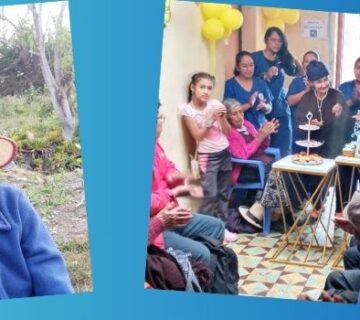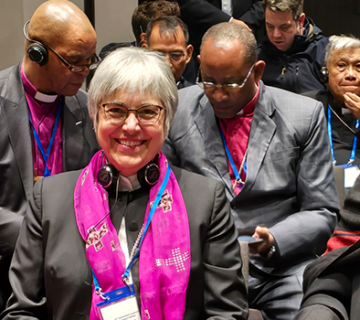From a talk given at a press conference on 18th November by Andrea Riccardi, founder of the Sant’Egidio Community and personal friend of Chiara’s.
A few days before the official opening of Chiara Lubich’s centenary on 7th December, we share part of a speech given at a press conference on 18 November by Andrea Riccardi, founder of the Community of Sant’Egidio. As a personal friend of Chiara’s with whom he worked to build pathways for unity among various Movements in the Church, he offered a reflection on Chiara’s humanity and historical authenticity, much of which is yet to be discovered.
Time sometimes reduces great figures to “prayer cards” which gather dust and are gradually forgotten. Chiara’s heart was full of Holiness but she was much more than a prayer card. She was a real woman, a “volcanic” woman, a native of Trent who was open to the world. Starting from Trent she went all over the world; that was Chiara’s story: from Trent to Rome and the world. What is said of her is true, that if you visit some of the remotest parts of the world, even in Africa, not only do you find Chiara’s followers, you also feel her presence and her thought.
A hundred years have passed since her birth. A hundred years is a long time. Chiara was born in 1920, the same year as John Paul II, and whenever he saw her he would call her “my contemporary”. Both were influenced by the tragic events of the Second World War. Chiara felt its effects deeply in Trent where her charism matured – so to speak – in the midst of the Second World War, in a world that was deeply divided and torn by the pain of war.
Chiara is also, in my view, an important figure outside the Church. She was not just a figure within the Church, even though she was deeply rooted in the Church, in unity with it, but she was always projected outwards to the world. She was not merely a “Sacristy Christian”; she loved and look outwards to the whole world.
Chiara was an historical figure. Twentieth-century Christianity was made up largely of men who left women to engage in a little bit of mysticism or some experience of charity. Instead, Chiara was a woman who made history in the round. Not only mysticism and charity but also politics and a passion for real change in life. This is the person I met.
She had a great capacity for personal relationships and friendship: she had the charism of friendship, everyone was unique for her. She was a woman who met thousands of people, and yet, for her, no two people were the same.
Then she had another great skill: that of communicating a passion. She was a passionate woman, passionate about the unity of the world. Unity is the key to understanding her existence and her quest for peace which is also ecumenism. She was deeply sensitive to ecumenism – more than many experts in ecumenism – and I would like to recall, in this regard, her relationship with Patriarch Athenagoras, about whom I have also written a book. There is also a letter that I published which stated “It is said of Miss Chiara Lubich that because she is a woman and is not a theologian she is too fervent”, but today I would like to say that, precisely because she is not a theologian and is a woman, Chiara understood more than the technicians of ecumenism.
Unity also means dialogue to achieve peace. Chiara wrote, “The children of God are the children of love, they fight with a weapon that is the very life of humankind”. Life is a gift and through the gift of life we struggle to change the world and to change others and achieve this ideal. Chiara was consumed by a passion for the ideal. And this seems to me to be a fundamental point to come back to and reflect on.
Maria Voce mentioned that we are in a time of division. I would add that we are also in a time of small passions. Chiara might be very unpopular today, precisely because the world believes in divisions and lives with its own small passions. But I believe that the year you are dedicating, that we are dedicating, to remembering, reviving the memory of and meeting Chiara Lubich is also a year that challenges both these little passions and being resigned to a divided world. Chiara wrote: “We hope that the Lord will bring about a new world order. He is the only one who can make humanity one family. Only He can bring out the distinctiveness of all peoples so that, in the splendour of each one being at the service of the others, the one light of life may shine forth. In this way our earthly homeland will be more beautiful and become a foretaste of the eternal homeland”.
I think that celebrating this centenary is a service to humanity and to the thought of our time, which lacks vision. Her contemporary Wojtyla wrote “the world suffers, especially for lack of vision”. I believe that this world of ours can flourish again with Chiara Lubich’s vision.
Just a word of warning: we need to be careful when we use the word celebration. Maria rightly prefers to speak of an encounter. It is a demanding encounter and this encounter, dear Maria, must also be history. We must have the courage to rewrite Chiara Lubich’s story in her time, to better understand how her action has changed history. I am thinking, for example, of the adventure of sending focolarini to Eastern Europe and how this contributed to the fall of the Berlin wall. Chiara did not choose to seek refuge in the West and be resigned to the wall. And so I am sure that this centenary year, which begins today, will make the person of Chiara grow in a new encounter with our times, and not diminish her.


 Italiano
Italiano Español
Español Français
Français Português
Português




Belíssimo texto. Obrigada Andrea Riccardi. Tenho muito forte o Carisma da UNIDADE em meu coração. Reescrever a história de CHIARA e para mim o fortalecer este amor recíproco que ela nos deixou !
Temos que ter coragem de reescrever a história de Chiara…
Chiara não é comum seu Carisma é universal.
Jesus em nosso meio. Com Chiara pudemos sentir Sua presença vivendo o amor recíproco. Vimos muitos comportamentais hostis se transformarem